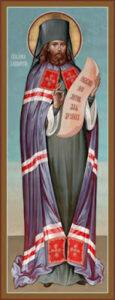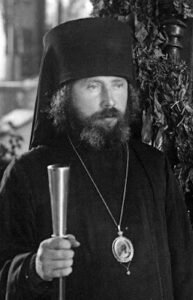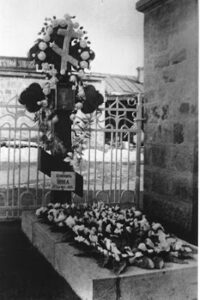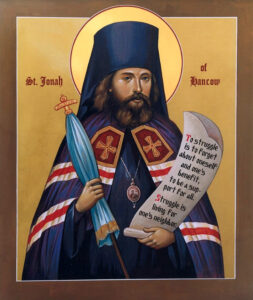
Have you heard of Saint Jonah? I had not till I discovered him on the calendar of the Greek Orthodox Archdiocese. Brothers and sisters, this is a beautiful, sad, inspiring story. Please keep reading!
What follows here is taken largely from a text found in many places without attribution, so I don’t know the original source. I’ve abbreviated and clarified it somewhat and also added a few items from other sources, as noted.
The Life of Saint Jonah
By the time of his repose on October 20, 1925, Bishop Jonah of Hankow (Manchuria) had already made a deep impression on his contemporaries by his God-pleasing life, his cheerful, energetic activity, and his unremitting love. His brief, three-year episcopacy was marked by a wealth of accomplishments. He died at the age of only 37, crowned by holiness.
- October 7 Old Calendar, which was the calendar he used
Vladimir Pokrovsky was born on April 17, 1888 to a peasant family in the Kaluga district of Russia. Orphaned early, he was adopted by a rural deacon and grew up in poverty. He managed while still young to learn the Church Slavonic language of the Old Testament, and was in the top of his class at seminary and again at the Kazan Theological Academy. In his third year at the academy he received the monastic tonsure, and was given the name Jonah. He then went to Optina Monastery where he was ordained a hieromonk.
Father Jonah returned to the Kazan Theological Academy, graduated in 1909, and then accepted a professorship, teaching New Testament. In 1916, during World War I, Hieromonk Jonah became the main chaplain of the Russian 11th army. Before the war, a seemingly great field of opportunity spread out before the young hieromonk—a scholar, priest and preacher—but very soon it was eclipsed by the horrific events of the Bolshevik Revolution in 1917. Father Jonah was banished from Kazan; in Perm he was arrested and then beaten to unconsciousness by the Bolsheviks. He was then sent for trial in Tyumen, Siberia.

On the way, providentially he was freed in Omsk by the White Army and was appointed senior priest of the southern volunteer army. When they suffered defeat by the Red Army, Father Jonah retreated with the army across the eastern frontier into China. The strenuous trek through Turkestan and the Gobi Desert, and then across the Pamir mountain range was made more difficult by a scarcity of supplies. In places they had to scale ice-covered hills, clutching onto projections and scant shrubs, their bare hands torn and bleeding. Through all this the Lord preserved Father Jonah, as he himself declared, for later service as a bishop.
His work in China
Having arrived to the Western China, Father Jonah came first to Shanghai where he was appointed to serve the Russian mission in Beijing. In September 1922, in Beijing, he was consecrated Bishop of Tianjin and vicar of the Beijing Mission, and was appointed rector of Saint Innocent Missionary Cathedral in the city of Manzhouli, in Inner Mongolia near the Russian border. Bishop Jonah arrived in Manzhouli on October 19, 1922, and began his holy work, proclaiming the Gospel of Christ.
Bishop Melety (who later became Metropolitan of Harbin and Manchuria) wrote describing the first steps of his archpastoral service:
“The people in the city of Manzhouli who had come from different parts of Russia had not been brought up properly with regard to religious attitudes. The new large and magnificent church of the Mission was poorly attended with only a small number of worshippers. Sermons were very weak and ineffective. A zealous servant of God’s Church and an outstanding preacher, the young and energetic Bishop Jonah first of all undertook the education of his flock in the religious and moral life. He established regular divine services, gathered an excellent choir, and he constantly preaches the Gospel. The temple is filled with worshippers, packed with people. However, for the vigorous Bishop Jonah, this all seems insufficient. By the invitation of city council, he teaches God’s Law in a local secondary school. The pupils, who have grown fond of him, although knowing that passing an examination in God’s Law is not mandatory for them, have declared the desire to undergo an examination in this subject, and everyone was found to have good knowledge of it” Bishop Melety, “In memory of Blessed Jonah”, Harbin (Special release, 1992), page 3.
 Joachim Krupenin, an admirer of the bishop, wrote the following about his arrival: “Everybody remembers the arrival of the bishop in Manzhouli. All waited for the bishop to be the way ordinary people visualized him; that is, full of greatness, importance and inaccessibility. But Bishop Jonah knew where and to whom he was going. He knew who and what awaited him. He knew that he would not be needed satiated and satisfied. The destitute were waiting for him, and he came to them. He has come not just as prince of Church but as loving friend and father—modestly, with affection and consolation for all. All were amazed by the extraordinary simplicity and availability of the archpastor upon his arrival. As a bright icon lamp lit in Manzhouli, the activity of Bishop Jonah has lit up like the face of Christ, calling to sufferers: “Come to me all you who labor and are heavy laden, and I will give rest to your souls.” All felt joy, for they understood that not all is lost when they have heard the vigorous appeal: “There is a way out—belief in God and love for your neighbors.” With this appeal for belief in God and love for neighbors began Vladika’s archpastoral activity. But words were not enough. Work was required. Huge work was needed. And work has begun… Not sparing his strength and health, and forgetting himself, he has given himself to the service of God and neighbors” (Joachim Krupenin, “Blessed Jonah, Bishop of Hankow, Personal Reminiscences of Bishop Jonah” (in Russian [Originally printed in China in 1925], pp. 14-15).
Joachim Krupenin, an admirer of the bishop, wrote the following about his arrival: “Everybody remembers the arrival of the bishop in Manzhouli. All waited for the bishop to be the way ordinary people visualized him; that is, full of greatness, importance and inaccessibility. But Bishop Jonah knew where and to whom he was going. He knew who and what awaited him. He knew that he would not be needed satiated and satisfied. The destitute were waiting for him, and he came to them. He has come not just as prince of Church but as loving friend and father—modestly, with affection and consolation for all. All were amazed by the extraordinary simplicity and availability of the archpastor upon his arrival. As a bright icon lamp lit in Manzhouli, the activity of Bishop Jonah has lit up like the face of Christ, calling to sufferers: “Come to me all you who labor and are heavy laden, and I will give rest to your souls.” All felt joy, for they understood that not all is lost when they have heard the vigorous appeal: “There is a way out—belief in God and love for your neighbors.” With this appeal for belief in God and love for neighbors began Vladika’s archpastoral activity. But words were not enough. Work was required. Huge work was needed. And work has begun… Not sparing his strength and health, and forgetting himself, he has given himself to the service of God and neighbors” (Joachim Krupenin, “Blessed Jonah, Bishop of Hankow, Personal Reminiscences of Bishop Jonah” (in Russian [Originally printed in China in 1925], pp. 14-15).
In the three years of his episcopate, he fulfilled Christ’s principal commandment of love of neighbor to such a degree that it would take even an ordinary worker several decades to do as much. The dimensions and strength of this activity were remembered equally by the Orthodox and non-Orthodox. His Eminence Melety summed up Bishop Jonah’s activity: “He fed the hungry, gave drink to the thirsty, took in strangers, clothed the naked, and visited the sick.”
Biahop Jonah worked with unflagging effors on behalf of children, for whom an orphanage was established. Nor were the needs of adults neglected. Somehow he found time and strength for everyone, Russian and non-Russian.
The childrens’ shelter Bishop Jonah had established was his joy and consolation. When he grew weary he would go and “spend time with the youngsters,” as he would say. By the time of his death, the orphanage had space for forty children ages five to fourteen. He established a free elementary school and high school for up to five hundred students, with a cafeteria that fed two hundred people per day for free. An outpatient clinic provided medical aid and medicines to the poorest people of Manzhouli, free of charge. A library and reading room was set up for the people of Manzhouli, where books were also sold.
V. V. Frolov wrote: “A characteristic feature of these quickly developing activities was their constant improvement. In the summer there were excursions for school children, a summer residence for orphanage children; a fine string band was organized at school; a scientific cinema was organized, which were used by all educational institutions of the city for a rather low tuition or for free. Every year at school new craft workshops opened. Children’s evening arrangements, performances, Christmas celebrations, and school exhibitions became events in the city. Simultaneously large-scale work in the church was undertaken. The church was restored again; a new part was built for early Liturgy. The organization of divine services during Bishop Jonah’s tenure can never be forgotten by those who lived in Manzhouli. An excellent orator, blessed Bishop Jonah attracted a multitude of people to the church; on great feasts the large church was always overflowing. Experts on church singing confirm that Manzhouli’s hierarchical choir was comparable with any of the best choirs of Harbin. And all this was accomplished in a time when economic vitality everywhere was quickly fading. … It was only for himself that he found no time.” V. Frolov, “Blessed Jonah, bishop of Hankow, Personal Reminiscences of Bishop Jonah”, p. 33

Saint Jonah’s Death
His death was completely unexpected. Bishop Jonah had been caring for a priest who died of typhoid fever. He himself contracted chronic tonsillitis just days before the scheduled fall collection for the orphanage. Suggestions to postpone it were of no use. Feverish, barely able to stand, the Bishop blessed the collection carts from the window of his study and remained there as the carts returned, calling each driver for a report on the result of his expedition.
Bishop Jonah’s sickness went into blood poisoning, now known as “sepsis”, which left untreated can quickly lead to death, *
- I can relate to this. I had sepsis summer before last. Thank God it was caught in time and treated (with modern medicine it can be cured), and that’s why I’m sitting here writing this Post.
When, to everyone’s dismay, it became evident that death was imminent, according to Archbishop Melety, who witnessed the Saint’s final hours, he began preparing himself, solemnly and imperturbably, for his passage to eternity.
I found the following account of his death on the site of Saint Jonah Orthodox Church in Spring, Texas: https://saintjonah.org/about-st-jonah-of-manchuria/”
“[As prayers were offered in church for the health of Bishop Jonah] one could hear the insistent cries of the children: ‘Dear God, please, do not take away our Bishop!’
“Returning to his room, Bishop Jonah individually blessed those tearfully crowded in his quarters. He then put on the epitrachilion and cuffs which had belonged to Elder Ambrose of Optina and began loudly and with prostrations, to read the canon for the departure of the soul. He asked to be buried in his white, embroidered vestments, simply, without pomp. Then, overcome with weakness, he lay down on his bed: “God’s will be done. Now I shall die.”
“He then was given a cross and candle to hold and died within minutes, surrounded by many of his close friends. His soul was transported to that other world, which knows neither sickness, nor sorrow, nor sighing, but life everlasting in the joy of the Lord.
 “Manzhuria’s entire populace – Orthodox and non-Orthodox alike – mourned the Bishop’s death. It brought an immense moral loneliness, an emptiness which even grief failed to satisfy. The mass of burning candles at his gravesite reflected but dimly the light he had brought to the hearts of men. In this light his memory is preserved for all eternity”.
“Manzhuria’s entire populace – Orthodox and non-Orthodox alike – mourned the Bishop’s death. It brought an immense moral loneliness, an emptiness which even grief failed to satisfy. The mass of burning candles at his gravesite reflected but dimly the light he had brought to the hearts of men. In this light his memory is preserved for all eternity”.
8,000 people attended his funeral. (The population of Manzhuria at that time was 10,000.)
The miracle
Leaving this world did not keep him from being with his spiritual children. A ten year old boy, Nicholas Dergachev, who was crippled, had been suffering from an inflammation of the knee joints. Efforts to straighten his legs caused unbearable pain. It was impossible for him to stand, much less walk. Early one morning he had a dream. A hierarch vested in white appeared to him and said, “Here, take my legs. I don’t need them anymore. And give me yours.” The boy woke up, miraculously healed. From a photograph he identified the hierarch in his dream as Bishop Jonah, who had died that very night, October 7/20, 1925.
After his death
Saint Jonah’s body was buried in 1925 near the Saint Innocent Cathedral. However, following the Chinese Communist revolution, the cathedral was blown up and the graves demolished.
In 1996, a time when Christians had regained some freedom in China, some émigrés from Manchuria realized a long-standing intent and were able to search for Bishop Jonah’s relics. They found nothing.
No matter, Bishop Jonah’s people never forgot him: his love for all, his ascetic labors, whole life aflame with love for his neighbors, especially for the children, and his unbounding charitable works, all accomplished in so very little time.

The hierarchs of the Far East, his clergy and flock, recalling both his life and also the miracle wrought after his burial, the Synod of Bishops of the Russian Orthodox Church Outside of Russia determined that Bishop Jonah of Hankow be revered as one shone forth, pleasing God on earth, and is now in the choirs of saints. Therefore the Council of Bishops of the Russian Orthodox Church Abroad, on August 20/31, 1996, blessed Bishop Jonah’s formal glorification as Saint Jonah of Manchuria.
Next Week: Saint James of Jerusalem, Brother of the Lord and First Bishop of Jerusalem
Week after Next: “From ghoulies and ghosties and long leggety beasties, Good Lord, deliver us…”
Fr. Bill,
Thank you for sharing the life story of this formelry little known and apparently courageous and devoted Saint with us all His story should be an inspiration for us all. May God continue to bless your vital ministry. With love in Christ, Adelphikos,
+Rev. Dr. Emanuel S. Chris, M.D., M. Div.